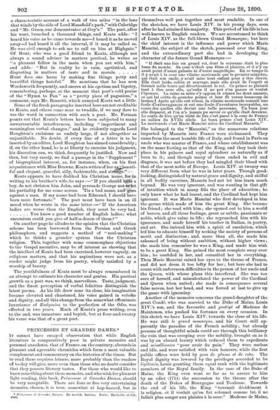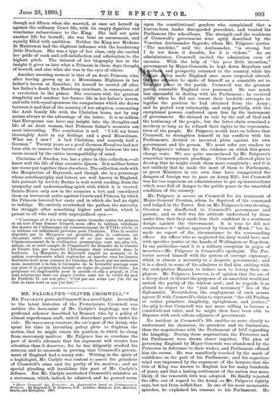PRINCESSES ET GRANDES DAMES.* IT cannot have escaped observation that
while English literature is comparatively poor in private memoirs and personal anecdotes, that of France, on the contrary, abounds in pleasant and agreeable chronicles which form a most valuable -complement and commentary on the histories of the times. But to read these requires leisure, more probably than the readers of to-day will give, more even than those who no doubt consider that they possess literary tastes. For those who would like to know something about these memoirs, and who wish for pleasant light reading, this book, Princesses et Grandes Dames, should be very acceptable. There are four or five very entertaining memoirs, chosen, it is true, somewhat at hap-hazard, but in
• Princesses et Grandes Dames. By Aryede Barbie. Paris: Hachette et Cie. 1890.
themselves well put together and most readable. In one of the sketches, we have Louis XIV. in his young days, soon after he had attained his majority. This period of his life is less well-known to English readers. We are accustomed to think of Louis XIV. as the full-blown Grand Monarque ; but here the chief interest is the influence and power which Marie Mancini, the subject of the sketch, possessed over the King, and the extraordinary part she had in developing the character of the future Grand Monarque
"11 etait nne fois un grand roi, dont le royaume etait le plus beau du monde. Sa qour n'etait que fates et plaisirs, et it n'y en avait point d'aussi galante ni d'aussi magnifique. En ce temps-le it y avait a la cour une vilaine moricaude que Is premier ministre, qui etait son oncle, y avait miss tout enfant pour y Atre elevee. Elle etait laide, colere et sauvage, mais elle avait de l'esprit et faissait mille tours qui divertissaient le roi. Ce prince se plaisait taut a etre avec elle, qu'enfin it ne put s'en passer et voulut repouser. La reins sa mere s'y opposa et separa les deux amants, ce qui lui costa de grandes peines et leer fit verser beaucoup de larmes.1 Apres qu'elle eut reussi, la vilaine moricaude commit une foule d'extravagances et eut nne fouls d'aventures incroyables, au tours des quelles elle devint une belle personae. IIn beau jour elle disparut, et l'on n'a jamais pu savoir ce qu'elle etait &venue. Le conte de fees qu'on vient de lire s'est passe e la cour de France an milieu du XVII° siecle. Le beau prince c'est Louis XIV. La moricaude c'est Marie Mancini niece du Cardinal Mazarin."
She belonged to the " Mazarini," as the numerous relations imported by Mazarin into France were nicknamed. They came from the most humble life of Italy, and found in Paris an uncle who was master of France, and whose establishment was on the same footing as that of the King, and they took their place in his palaces and royal splendour as naturally as if born to it; and though many of them ended in evil and disgrace, it was not before they had mingled their blood with that of the most noble of Europe. Louis XIV. at twenty was very different from what he was in later years. Though good- looking, distinguished by natural grace and dignity, and skilful in all bodily exercises, Mazarin had not let him learn much beyond. He was very ignorant, and was wanting in that gift of intuition which in many fills the place of education ; he only knew what he had learnt, and the Cardinal had kept him ignorant. It was Marie Mancini who first developed in him the germs which made of him the great King. She became his friend; she read with him ; she opened out to him a world of heroes, and all those feelings, great or subtle, passionate or noble, which give value to life; she reproached him with his ignorance, and made herself his teacher in Italian, in poetry, and art. She imbued him with a spirit of emulation, which led him to educate himself by seeking the society of persons of merit and distinction ; and, more than all, she made him ashamed of being without ambition, without higher views ; she made him remember he was a King, and made him wish to be a great King. She gained the most complete sway over him ; he confided in her, and consulted her in everything.
Then Marie Mancini raised her eyes to the throne of France, and did not deem it too lofty for her ; but here she had to count with unforeseen difficulties in the person of her uncle and the Queen, with whose plans this interfered. She was too sure of herself, and miscalculated the power of the Cardinal and Queen when united ; she made in consequence several false moves, lost her head, and was forced at last to give up the game with ignominy.
Another of the memoirs concerns the grand-daughter of the great Condo, who was married to the Duke of Maine, Louis XIV.'s son, and the favourite and proMge of Madame de Maintenon, who pushed his fortunes on every occasion. In this sketch we have Louis XIV. towards the close of his life. He was still le grand monargue, and his Court still ap- parently the paradise of the French nobility ; but already persons of thoughtful minds could see through this brilliancy the ruin that was creeping over the nobility, brought on as it was by an absurd luxury which reduced them to expedients and misalliances "pour avoir du pain." They were useless and idle, and were satisfied with vain honours, while the first public offices were held by gene de plume et de robe. The Royal dignity was lowered by the privileges accorded to les lggitimgs, Louis granting them equal rank with the legitimate members of the Royal family. In the case of the Duke of Maine, the King even went so far as to assure to him
by an edict (1714) the succession to the throne after the death of the Dukes of Bourgogne and Toulouse. Towards the end of his life, the King " tournait decidement a
la religion, et ii voulait qu'on fut solennel comme lui, it ne fallait plus songer aux plaisirs it la cour." Madame de Maine, though not fifteen when she married, at once set herself np against the ordinary Court life, with its empty dignities and wearisome subservience to the King. She laid out quite another life for herself ; she was bent on amusement, and equally filled with ambition. Neither the King nor Madame de Maintenon had the slightest influence with the headstrong little Duchess. She was a type of her class, only she carried her pride of rank and self-satisfaction and admiration to the highest pitch. The interest of her biography lies in the insight it gives us into what a Princess in those days though of herself, and also what she was in the eyes of others.
Another amusing memoir is that of an Arab Princess, who,' after having grown up as a Mussulman Highness in her father's harem at Zanzibar, let herself be carried off after her father's death by a Hamburg merchant, in consequence of a revolution in the palace. She recounts with the greatest simplicity and candour her former life hi her father's harem, and tells with equal openness the comparisons which she draws between it and that of the country of her adoption, contrasting the Arab family life with the Christian home, not by any means always to the advantage of the latter. It is so seldom that Europeans can have any insight into the thoughts and life of an Arab woman, that Princess Sabne's memoirs are most interesting. The conclusion is sad. " I left my home
thoroughly Arab in my feelings and a good Mussulman What am I now P A bad Christian, and scarcely half a German." Twenty years as a good German Hausfrau had not been able to remove the barrier of antipathy between the two
races caused by the entire incompatibility of mind.
Christina of Sweden, too, has a place in this collection,—all know well the life of that eccentric Queen. It is neither better nor worse put together than elsewhere. The collection ends with the Margravine of Bayreuth, and though she is a personage whose autobiography and letters are well known in England, this portrait by Arvede Baxine is well worth reading, from the sympathy and understanding spirit with which it is treated.
Sainte-Beuve only saw in the memoirs a tort, and considered them an irreverent satire against Courts and Princes, by which the Princess lowered her caste and in which she had no right
to indulge. He entirely overlooked the pathos, the sincerity, the struggle after something higher and nobler, which is patent to all who read with unprejudiced eyes :—
" L'ouvrage ou it n'a vu qu'une satire etourdie contre les princes et un tort d'une femme d'esprit, nous offre le tableau veridique des mceurs de l'Allemagne au commencement du %Ville siècle, et ce tableau eat infiniment precieux pour l'hiatoire. Plus is societe depeinte par la Margrave est grossiere, plus le contrasts est ehoquant entre cette grossierete et ce que nous savons de repanouissement de la civilisation germanique cent ans plus tot, mieux, on se rend compte de l'immensite du desastre de la Guerre de Trento Ans, par laquelle l'Allemagne etait retombee dans in barbarie. La Margrave de Bayreuth naquit au moment oh la nation convalescente allait reprendre as marche vers les hautes destines dont nous sommes lee temoins, de facon que ses memoires nous montrent a la foie le triomphe de is brutalite sauvage sow son pere et la preparation latent° an regne du grand Frederic. La princesse est impitoyable pour le monde oh elle a grandi, at l'on sent neanmoins dans ces pages ecrites sans art is verite du mot de Frederic II. sur son pere : C'est par ses soins que j'ai etc en etat de faire tout ce que j'ai fait."'



















































 Previous page
Previous page